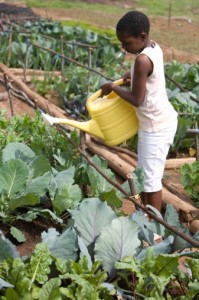
Business Report (Johannesburg) | May 25, 2010
By INGI SALGADO
Africa, with an estimated 700 million hectares of cheap potential new farmland, has been attracting the attention of foreign investors from nations seeking to enhance food security.
Foreign companies with funding from the likes of China, the United Arab Emirates and India have been acquiring land across sub-Saharan Africa. Ethiopia alone has reportedly approved more than 800 foreign-funded agro-projects since 2007.
Africa is viewed as a particularly attractive food basket by water-challenged Middle Eastern nations and China, struggling with soil depletion. These countries aim to create stable supply channels for food and agro-fuels that bypass agro-commodity markets in a climate of rising prices.
Somewhat ironically, the food self-sufficiency of many of the African countries targeted for investment has been eroding.
Last week, the UN Conference on Trade and Development said the continent had lost 20 percent of its capacity to provide food over the past four decades owing to underinvestment. Some pin the blame on the structural adjustment programmes of the World Bank, which required the phasing out of government controls and support mechanisms.
The UN's various bodies convened a team of experts last year to create a plan of action for dealing with the growing global food crisis. Their proposed solutions hinge on increased productivity, investment in inputs and technology, and lower tariff barriers.
The South African government made it clear it doesn't think much of some aspects of this proposal when Agriculture, Forestry and Fisheries Minister Tina Joemat-Pettersson said during her budget vote last week that there was room for raising tariffs on agricultural imports.
She also put a figure on the "substantial scope" that still exists under the World Trade Organisation for additional South African government support to farmers: R11 billion in price and production-distorting support, and more than R500 million for export subsidies.
Achieving a consensus view on how to end world hunger is likely to be elusive for as long as tensions exist around the developed world's support for its agricultural output, let alone the role of industrial agriculture versus small farming.
In the meantime, Africa's farmers continue to face a credit shortfall, and it is unclear where the bulk of $40bn (R312bn) that the World Bank tells us is needed to restore global food security is going to come from. Developed countries have coughed up just a third of this amount.
It now seems as if South Africa, which became a net importer of food two years ago after two decades of net exporting, is developing African agricultural ambitions of its own. Earlier this month, Farmer's Weekly reported that Nedbank had initiated a R6bn African agricultural fund with the support of Joemat-Pettersson's department. Half of this sum will be set aside for commercial farmers wanting to set up operations outside South Africa.
AgriSA supports the plan, saying South African farmers who relocated to other African countries should be viewed as "national out-growers" in a bid to ensure the country's food security. AgriSA said the exodus of farmers could not be stopped, but insisted links should be kept.
The extent to which we may come to rely on farmers in the Democratic Republic of Congo, Mozambique and Uganda for our food security will depend on how quickly our national planners and the government deal with the many issues confronting South African agriculture.











